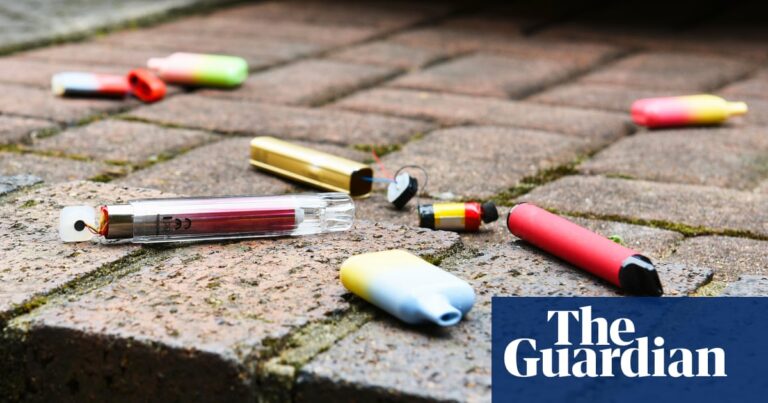New research from the University of Bath has revealed that seven vaporizers claiming to contain cannabis actually contained far more dangerous 'synthetic cannabinoids' (SC) compounds.
Earlier this year, the institute published research showing that more than one in six vaporizers seized from school children across the UK contained SC.
Sam Craft, author of both studies, said his team decided to examine the contents of seven e-cigarettes that a person submitted to drug and alcohol services after experiencing strange effects. said.
Kraft said the person was an “experienced marijuana smoker” who decided to switch to e-cigarettes because he thought they were less harmful.
Cannabis is illegal in the UK, but the man obtained the vaporizer from a friend who had bought one from the US. According to Kraft, when the person first started using these e-cigs, he described the effects as “powerful but enjoyable,” but after a while he began to experience stomach cramps and irritability. “Then when they tried to quit, they started having symptoms that were actually consistent with synthetic cannabinoid withdrawal: panic attacks, extreme anxiety, things like that.”
Analysis of e-cigarettes revealed that all of them contained SC 5F-MDMB-PICA. There are hundreds of different SCs, formally named by these letter-number combinations and colloquially referred to as “K2,” “spice,” and other slang terms.
Unlike natural cannabis, it is often associated with severe negative consequences such as seizures and fatal overdose. In England and Wales, SC accounted for almost half of all unnatural deaths in prisons between 2015 and 2020.
SC is also illegal in the UK and US. Still, the unregulated U.S. economy that came about as a result of the 2018 Farm Bill, which inadvertently legalized all cannabis-derived products containing less than 0.3% delta-9 THC, cannabis' best-known psychoactive ingredient, They are appearing in the cannabis market.
SC is different from semi-synthetic cannabinoids such as THC-O and sometimes HHC and Delta-8 THC. These are made from a combination of natural cannabis extracts and synthetic materials and are legal in most of the United States.
But that doesn't mean they aren't at risk, said Michelle Peace, a professor in the Virginia Commonwealth University forensic science department. Peace's lab studied the contents of e-cigarettes seized from people who were arrested after experiencing schizophrenia-like symptoms. Her lab found that the e-cigarettes contained semi-synthetic cannabinoids like THC-O.
Former DEA Chief of Staff Jim Crotty said SC is attractive to illegal manufacturers because it is incredibly cheap to produce and sell. Instead of growing fields, manufacturers can make SC vapes using packets of powder purchased online.
Crotty said these products could be appealing to “vulnerable populations with limited incomes, such as young people and people without housing,” who find legal dispensary products unaffordable. It states that there is.
It's unclear how big the problem is, in part because consumers themselves are likely unaware that they are using contaminated products. Peace said most consumers would “walk into any store” and assume that someone has checked everything they buy for safety. However, there is still no federal regulation of the legal hemp market, and “nobody watches” what manufacturers put in their products, Peace said.
Crotty added that cannabis is an easy drug to counterfeit because it is so unpredictable.
“It doesn't exactly fit into any category of drug, right? Because it can cause different effects depending on the amount, potency, and the individual using it,” he explains, noting that cannabis is a stimulant. , adding that it can feel like a depressant, a hallucinogen, or a little bit of all three.
Kraft says SC can appear similar to natural cannabis, especially at very small doses like the vaporizers they studied. However, “the risk of cardiovascular disease, impaired consciousness and acute psychotic symptoms would be much higher,” he said.
At this time, it is very difficult to determine whether unregulated hemp products are accurately labeled in the United States. Peace says if you live in a state where recreational marijuana is legal, it's much safer to buy products from licensed dispensaries, but these aren't completely risk-free either.
Legal and industry efforts are underway to bring safety standards for currently unregulated hemp products at least on par with the state-legal cannabis industry. The Cannabinoid Safety and Regulation Act, introduced in Congress in September, would give the FDA the authority to regulate hemp products.
Some cannabis brands are committed to ensuring that their products only contain what they claim.
Recreational cannabis brand Wana has launched a direct-to-consumer platform selling vetted hemp products and educating consumers on which products are safe.
“We apply the same testing, transparency and ingredient rigor on the hemp side as we do in regulated markets,” says Wana CMO Joe Hodas. But in a side of the industry that seems to have little concern for safety, “it's a tough and lonely road,” he says.

